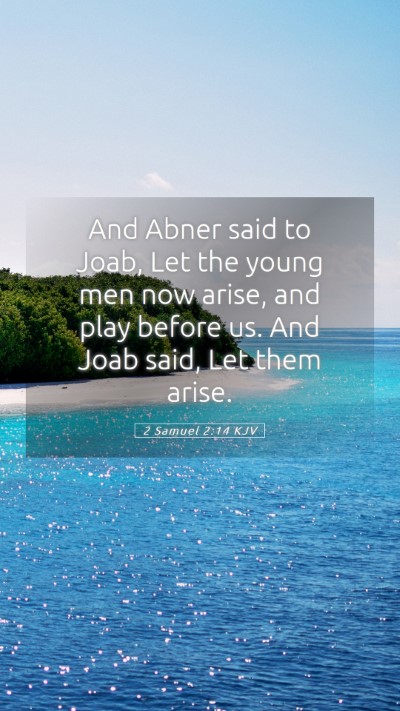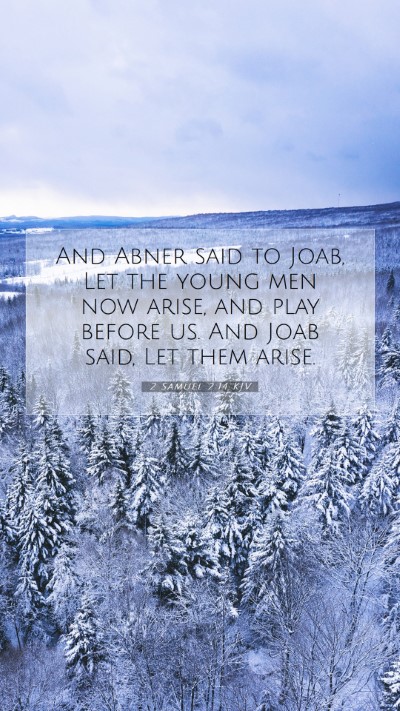Understanding 2 Samuel 2:14
Verse: "And Abner said to Joab, 'Let the young men now arise and compete before us.' And Joab said, 'Let them arise.'" (2 Samuel 2:14, NKJV)
Overview of the Verse
This verse captures a pivotal moment of tension and rivalry between Abner, commander of Saul’s army, and Joab, commander of David’s forces. The challenge symbolizes deeper conflicts between the factions of Saul's house and David's emerging kingship. To better understand this verse, various commentaries provide insights into its historical and theological implications.
Bible Verse Meanings
The interactions between Abner and Joab reflect the ongoing civil strife in Israel. Both commanders represent their respective leaders, and their dialogue sets the stage for a confrontation that illustrates the broader conflict for the throne of Israel.
Insights from Commentaries
-
Matthew Henry's Commentary:
Matthew Henry emphasizes the reckless challenge posed by Abner. He views it as an invitation to engage in a brutal confrontation and a test of strength that could yield devastating consequences for both sides. Henry notes that such challenges were common in ancient warfare, reflecting the prevalent warrior culture.
-
Albert Barnes' Commentary:
Albert Barnes highlights the strategic nature of Abner's challenge. It serves as a test not only of physical strength but also of loyalty and courage among the troops. Barnes points out that this desire to compete reflects the intense rivalry amid the political tension following Saul's death and shows how personal and nationalistic pride can challenge prudence in warfare.
-
Adam Clarke's Commentary:
Adam Clarke elaborates on the context surrounding this challenge, suggesting that it was initiated to settle disputes and measure loyalty to either side. He notes that in this contest, the lives of the young men were put on the line, paralleling the stakes of the broader conflict for Israel's crown, a metaphor for the devastating costs of civil war.
Historical Context
2 Samuel 2:14 occurs during a tumultuous period in Israel's history. After the death of King Saul, the nation was divided, with factions supporting either Saul’s house or David's claim to kingship. The events surrounding this verse should be interpreted within the framework of Israelite politics of the time, characterized by rivalry and competition for leadership.
Significance of the Clash
This verse sets the tone for subsequent encounters between the two factions. It illustrates key themes of power struggles, the shadow of past conflicts, and the human inclination towards violence as a resolution to disputes. The challenge invites deeper contemplation on the nature of leadership, loyalty, and the costs of warfare, serving as a reminder of the perils of division.
Application of the Verse
For contemporary readers, this verse illustrates the consequences of conflict spurred by pride and ambition. In personal and communal contexts, it prompts reflection on how disputes may escalate and the importance of seeking reconciliation over rivalry. It encourages believers to pursue peace and unity rather than allowing division to fester.
Related Bible Cross References
- 1 Samuel 31:1-6 - The deaths of Saul and his sons and the implications for Israel.
- 2 Samuel 1:14-16 - David’s lamentation for Saul and Jonathan, showing his heart for reconciliation.
- 2 Samuel 3:1 - The ongoing conflict between the house of Saul and David, indicating long-term implications of this rivalry.


